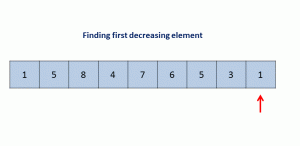The Next Permutation Algorithm in C++ (std::next_permutation)
- 时间:2020-09-18 17:39:21
- 分类:网络文摘
- 阅读:117 次
Implement next permutation, which rearranges numbers into the lexicographically next greater permutation of numbers.
If such arrangement is not possible, it must rearrange it as the lowest possible order (ie, sorted in ascending order).
The replacement must be in-place and use only constant extra memory.
Here are some examples. Inputs are in the left-hand column and its corresponding outputs are in the right-hand column.
1,2,3 → 1,3,2
3,2,1 → 1,2,3
1,1,5 → 1,5,1
std::permutation in C++
The C++ std::permutation() takes two parameters, the start iterator and the finishing iterator (one element beyond), then returns its next permutation.
Therefore, by using the std::permutation(), we can easily solve the problem – without re-inventing the wheel.
1 2 3 4 5 6 7 | class Solution { public: void nextPermutation(vector<int>& nums) { if (nums.empty()) return; next_permutation(begin(nums), end(nums)); } }; |
class Solution {
public:
void nextPermutation(vector<int>& nums) {
if (nums.empty()) return;
next_permutation(begin(nums), end(nums));
}
};If not such permutation is possible e.g. the last permutation, then the next_permutation() will return false and set the permutation to the first permutation the smallest in the ascending order. For example, 54321’s next permutation will be 12345.
Implement the Next Permutation Algorithm
During an interview, the interviewer will not be looking for the above solution. Rather he/she will need the interviewee to implement the next_permutation().

Next Permutation Algorithm
As shown in the above animation, we need to scan backwards and find the first decreasing element. Then, we need to swap it with the next largest number. At least, the sub-vectors need to be reversed using std::reverse().
1 2 3 4 5 6 7 8 9 10 11 12 13 14 15 16 17 18 19 | class Solution { public: void nextPermutation(vector<int>& nums) { int sz = nums.size(); if (sz <= 1) return; int i = sz - 2; // find the decreasing element while ((i >= 0) && (nums[i] >= nums[i + 1])) --i; if (i >= 0) { // if there is.. int j = sz - 1; // find next larger number while ((j >= i) && (nums[j] <= nums[i])) { -- j; } swap(nums[i], nums[j]); } std::reverse(begin(nums) + i + 1, end(nums)); } }; |
class Solution {
public:
void nextPermutation(vector<int>& nums) {
int sz = nums.size();
if (sz <= 1) return;
int i = sz - 2;
// find the decreasing element
while ((i >= 0) && (nums[i] >= nums[i + 1])) --i;
if (i >= 0) { // if there is..
int j = sz - 1;
// find next larger number
while ((j >= i) && (nums[j] <= nums[i])) {
-- j;
}
swap(nums[i], nums[j]);
}
std::reverse(begin(nums) + i + 1, end(nums));
}
};The complexity is O(N) and a constant space is required. This puzzle is known to be asked during a onsite facebook coding interview.
Don’t forget to give your algorithmic complexity which is O(N).
Refer to C++ std::next_permutation() for more advanced tutorial.
–EOF (The Ultimate Computing & Technology Blog) —
推荐阅读:wordpress多说最新评论小工具美化技巧 wordpress如何调用具有相同自定义栏目名称及值的文章 为wordpress后台添加微软雅黑字体 wordpress主题制作时调用分类链接的方法 两种方法批量删除wordpress自定义栏目 如何获取wordpress外循环的自定义栏目 为wordpress媒体文件添加分类目录和标签的方法 小技巧:在wordpress仪表盘中双击评论内容可编辑评论 解决wordpress自动更新失败无法进入后台的方法及升级失败原因 通过.htaccess限制访问IP 保护wordpress后台安全
- 评论列表
-
- 添加评论